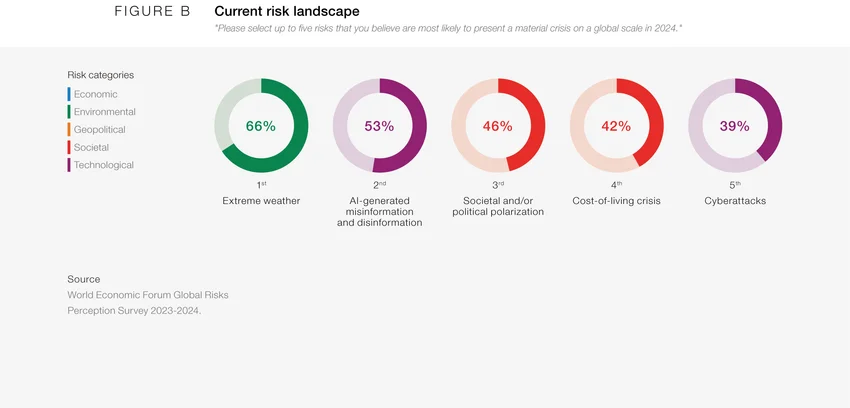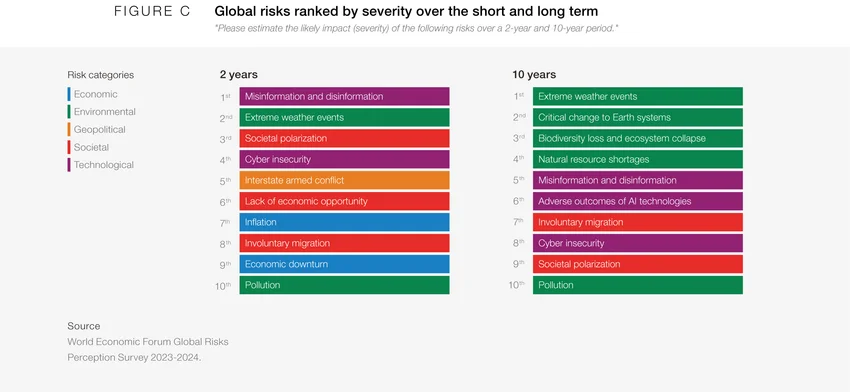A world on edge: the looming shadow of global risks in 2024


· 6 min read
As the curtain rises on 2024, the World Economic Forum's latest Global Risks Report paints a somber picture. It's a landscape where familiar anxieties like extreme weather and societal polarization share space with emerging threats like AI-fueled misinformation and a widening technological power gap. The report, released just before the annual Davos gathering, serves as a stark reminder that despite the absence of immediate global catastrophes like pandemics or major wars, the next decade is poised to be a tumultuous one.
The report identifies four key "structural forces" shaping the risk landscape over the next ten years: climate change, demographic shifts, technological acceleration, and geopolitical transformations. These forces are intertwined, creating a world in flux where uncertainty and volatility reign. In this environment, the capacity of societies to prepare for and respond to global risks will be severely tested.

Source: World Economic Forum Global Risks Perception Survey 2023-24
For the third consecutive year, environmental risks dominate the report, with extreme weather topping the list of concerns for 2024. The intensifying El Niño cycle is expected to unleash a torrent of heatwaves, droughts, floods, and wildfires, disproportionately impacting vulnerable populations. Even more worrying is the growing consensus that we are approaching several critical "tipping points" in the Earth's systems, beyond which irreversible and potentially catastrophic changes could occur. This urgency, however, is not universally acknowledged, with younger generations and the private sector expressing greater alarm than older age groups and government officials. This disconnect in perception could have disastrous consequences, delaying crucial interventions and tipping us closer to the precipice.
Another key theme is the rise of societal polarization. This increasingly acrimonious divide, both within and between nations, fuels political dysfunction and undermines our ability to collectively address global challenges. Adding fuel to the fire is the burgeoning threat of AI-generated misinformation and disinformation. Malicious actors, both foreign and domestic, are poised to weaponize these technologies to further entrench societal divisions, manipulate public opinion, and exacerbate existing tensions. This could have dire consequences, ranging from undermining the legitimacy of elections to inciting violence and unrest.
The rapid development of artificial intelligence presents both immense opportunities and daunting challenges. The report warns of a looming technological power gap, with advanced economies reaping the benefits of AI advancements while developing nations are left behind. This digital divide could further entrench existing inequalities, with vulnerable countries becoming increasingly isolated from the economic and social benefits of the AI revolution. Moreover, the lack of international collaboration on regulating AI could lead to the proliferation of its most dangerous applications, from cyberwarfare to autonomous weapons.
The report also anticipates a shift in the global power balance, with a multipolar world order emerging where middle and great powers compete for influence. This fragmentation of international governance could hinder our ability to address urgent global challenges, as cooperation becomes increasingly difficult in a fractured geopolitical landscape. Furthermore, the internationalization of conflicts, with major powers backing proxy wars, could lead to deadlier and more prolonged hostilities.
Despite the bleak outlook, the report also offers glimmers of hope. It emphasizes the importance of localized strategies, investments, and regulations in mitigating the impact of global risks. The private sector, in particular, has a crucial role to play in extending these benefits to all. Moreover, the report highlights the potential of R&D to strengthen our preparedness and improve our ability to respond to future challenges. Finally, it underscores the importance of cross-border collaboration, even in a fragmented world, for tackling existential threats like climate change and pandemic outbreaks.
One of the most potent takeaways from the report is the profound interconnectedness of global risks. This means that the impact of one risk can cascade and amplify the effects of others, creating a complex web of challenges. For instance, extreme weather events, fueled by climate change, can trigger food insecurity and mass displacement, which in turn can exacerbate societal tensions and conflict. Similarly, cyberattacks could cripple critical infrastructure, disrupting economies and potentially triggering political instability. This interconnectedness underscores the need for holistic solutions that address risks not in isolation but as part of a broader system.
The flip side of interconnectedness, however, presents opportunities for synergistic solutions. Investments in renewable energy not only combat climate change but also create green jobs and stimulate economic growth. Similarly, advancements in technology like early warning systems for extreme weather events can be leveraged to protect vulnerable populations and minimize damage. The key lies in understanding the complex interdependencies between risks and designing interventions that tackle them in a systemic and integrated manner.
This requires collaboration on multiple levels. International cooperation is vital for tackling existential threats like climate change and pandemics. At the national and regional levels, coordinated efforts between governments, civil society, and the private sector are crucial for building resilience and mitigating the impact of localized risks. Finally, individual citizens have a role to play in promoting understanding, empathy, and cooperation within their communities, fostering a collective sense of responsibility for our shared future.
By recognizing the interconnectedness of global risks and embracing the potential for collaborative solutions, we can navigate the turbulent waters of the next decade. From investing in resilient infrastructure to fostering international cooperation, every action, however small, contributes to building a more secure and sustainable future for all. The Global Risks Report 2024 serves as a clarion call for action, urging us to move beyond fragmented responses and embrace a holistic approach to risk reduction. Ultimately, it is through cooperation, innovation, and unwavering commitment that we can mitigate the interconnected threats we face and build a resilient and thriving world in the years to come.
The 2024 Global Risks Report serves as a sobering reminder of the complex and interconnected nature of the challenges we face as a global community. It challenges us to move beyond the politics of division and instead focus on collective action. Whether it's investing in renewable energy to combat climate change, regulating AI to prevent its misuse, or fostering international cooperation to address geopolitical tensions, the choices we make today will determine the fate of our world in the years to come. We must heed the warnings of this report and take decisive action to navigate the treacherous waters of the next decade, ensuring a future where global risks are mitigated and opportunities for all are realized.

Future Thought Leaders is a democratic space presenting the thoughts and opinions of rising Sustainability & Energy writers, their opinions do not necessarily represent those of illuminem.
Gokul Shekar

Effects · Climate Change
Simon Heppner

Effects · Climate Change
illuminem briefings

Climate Change · Effects
Mongabay

Climate Change · Effects
Financial Times

Climate Change · Effects
UN News

Effects · Climate Change